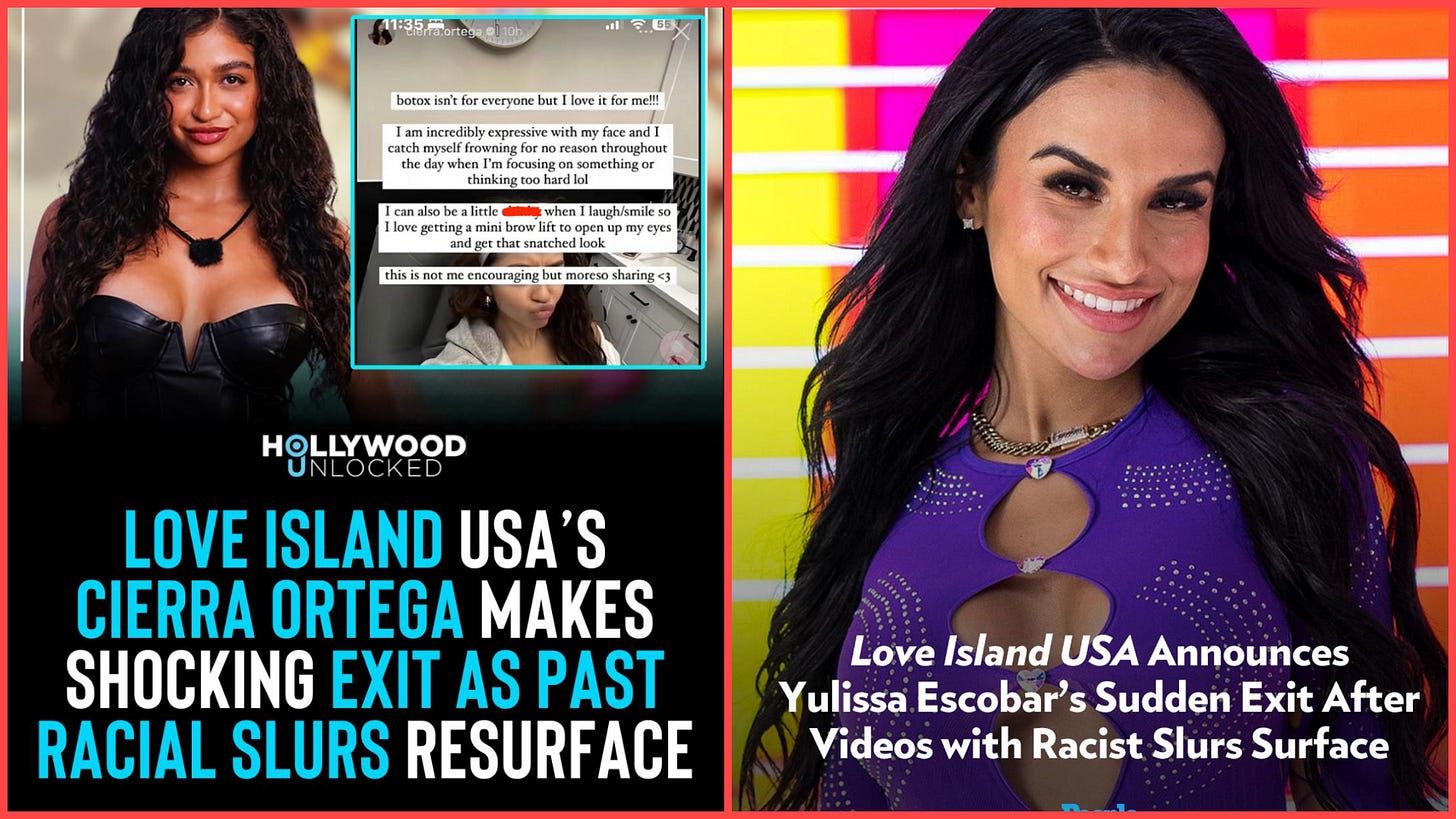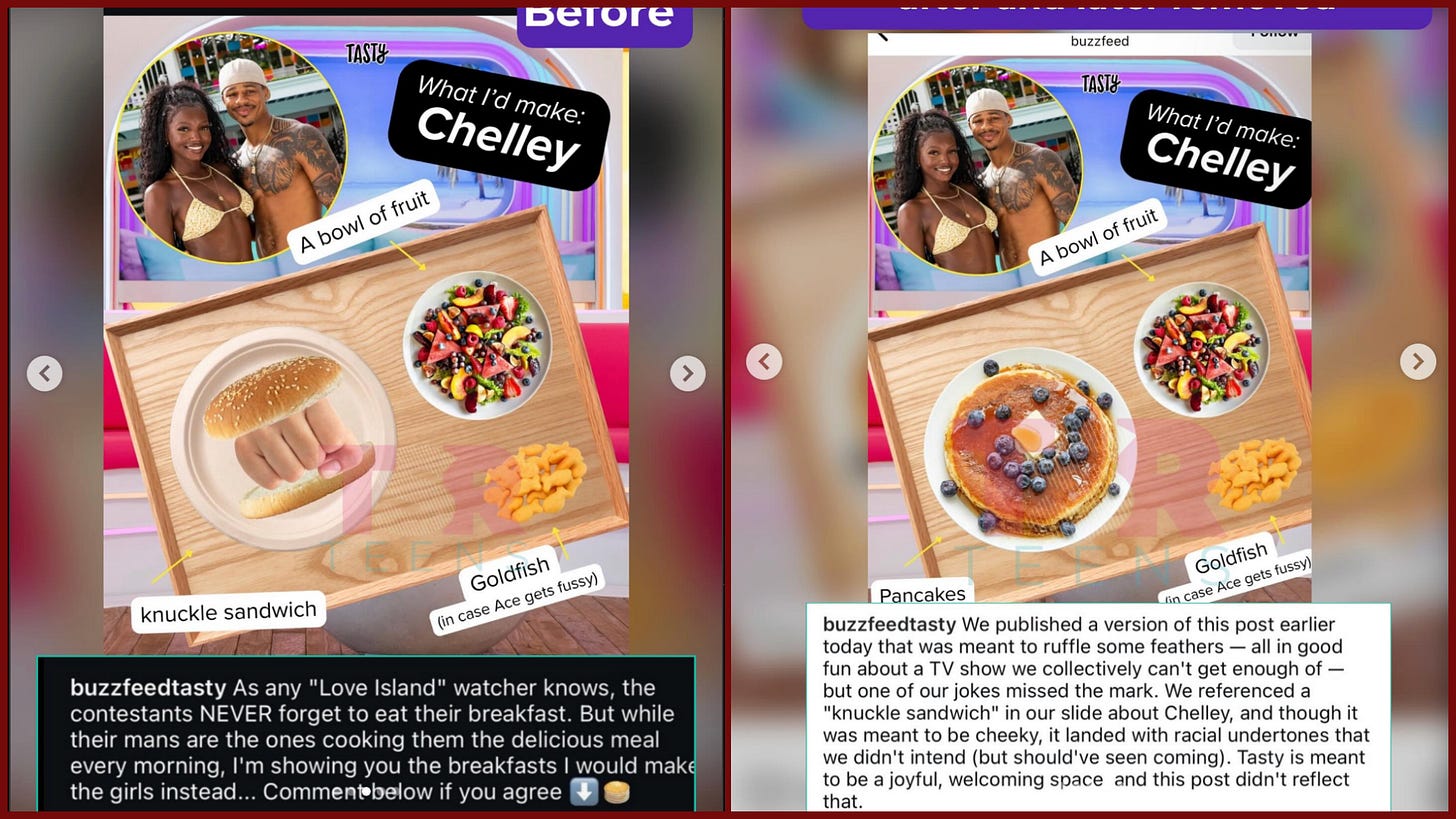A lot of y'all aren't woke, just assholes
Cancel Culture, Love Island, and the Spectacle of Selective Accountability
It turns out that how we interact with reality shows tells us as much about society as the shows do themselves. I tuned into Season 7 of Love Island USA, hoping to project my dating experiences on strangers and write a sociological analysis of Zillennial dating culture; instead, I’ve witnessed the most shameless display of performative activism from its audience I’ve seen in years. What was supposed to be about a microcosm of modern romance has turned into one about how social consciousness is conveniently weaponized as a form of social sabotage.
This season, two female contestants were removed mid-filming for their casual use of racial slurs within their digital footprint. Yulissa Escobar was discovered dropping N-word bombs on a podcast and, before you could even notice, was swiftly removed from set by the 2nd episode. Luckily for the production team, there would be another PR dumpster fire just a few weeks later. A 2023 screenshot of Cierra Ortega describing her pre-botoxed eyes with the C-word, an anti-asian slur, sparked a furious uproar on social media. As a result, Cierra was yanked off set a week before the show’s finale, without any seeming regard for how this would affect the show’s strategically curated storylines. This all sounds perfectly reasonable, even commendable, at first read. Love Island US Production’s team and audience take a no-tolerance stance on racism, right? Right? Not exactly.

The timing of events reveals a sinister motive behind the backlash. Both contestants’ digital skeletons circulated on social media around the same time in early June, yet one contestant, Cierra, was removed over a month after the other. Cierra, with her trendy LA baddie meets laid-back cool girl vibe, established herself as a fan favorite early in the show. When her 2023 screenshot hit the Love Island webverse, those who saw it brushed it off so quickly that it died before it gained any momentum. Cierra’s popularity continued to skyrocket across social media, her follower account crawling towards 1 million on Instagram. That is, until a light switched within a singular episode, and she went from a favorite to one of the most hated. Her sin? A perceived slight against another contestant. To a sane onlooker, it could be summed up as mild tension between friends. But in Love Island Culture, where the contestants unknowingly cultivate cult followings and the fans root for them with the fury of sports fans, a perceived slight can be a death knell to likability and all the privilege that comes with it. In Cierra’s case, it means going from ‘slightly problematic’ to ‘cancelled’ in the blink of an eye.
Once Cierra lost the cloak of likability, the offensive screenshot began recirculating, weeks after it died down. Only this time, it spread like wildfire across social media, prompting hurt and outrage to pour out from offended fans. Some took the backlash as a green light to spew vitriol at the contestant without any pushback. Angered fans spammed her socials with grotesque insults, mocked her relationship, and spread distorted images and juvenile TikTok edits portraying Cierra as the Season’s ultimate villain. In more extreme acts, viewers went as far as calling ICE on her parents and photoshopping fake Instagram messages to spread the false idea that Cierra was made aware that it was an offensive slur, but doubled down on using it anyway.
While this is happening, Cierra is completely unaware because Love Island contestants are isolated from all forms of outside social interaction. Nevertheless, the backlash raged on. It was so overwhelming that her friends were forced to stop managing her social media accounts because it was affecting their brand deals. This continued for a few days before the production team finally answered the angry calls for removal.
Once viewers saw that they could exploit any stain of ignorance against their least favorite contestants, my Twitter feed devolved into a digging frenzy. Fans searched for the mildest hint of a problematic past, intending to incite a similar hate mob against them. Across my socials, I saw reposted TikTok videos of one contestant mouthing the N-word while lip-synching, screenshots of another’s Instagram story highlight labelled “Free Tory”, praising the convicted rapper, and a screenshot of a different contestant in the Instagram likes of a years-old post from Trump. It was a race to the bottom, fueled by a hate fetish dressed up as moral concerns.
Ironically, as fans called for the contestants’ heads in the name of social justice, they remained oblivious to the internal biases shaping their opinions in the first place. For example, Chelly and Olandria— two Black women displaying the patience levels of stoic therapists during the season’s biggest arguments— were branded as “Bullies” over a minor friendship dispute in a single episode, causing the women to lose around 50,000 followers combined. Austin, a 6’4 white guy reminiscent of a 90s boyband member, continues to rake in support on social media despite reposting TikToks of Right-wing anti-Haitian propaganda. Contestants Hannah and Huda are labelled as “fast” and “slutty” for having sex on a show called Love Island, while the reputations of the men they sleep with go unscathed. When Ace tells his connection he’s uncomfortable with physical and verbal affection, he’s chastised as an 'asshole’, not recognized as someone simply setting a boundary. The truth is as uncomfortable as it is clear: fan favorites are influenced by relatability and relatability is influenced by perceptions of race and gender. As viewers remain unaware of their own biases, they demand a performance of social consciousness—reducing social justice to nothing but moral grandstanding, devoid of meaningful value. What is the impact of outlawing slurs if the prejudices behind the language continue to shape our actions and, by extension, our society? Season 7 of Love Island US shows that in the grand scheme of lived experiences, it’s very little.
This isn’t a call to trivialize the impact of offensive words, but we need some nuance. What we’re seeing is the result of allowing bad actors to turn the public utilization of social justice into a purity test. Publicly stoning someone who unknowingly uses harmful language with the same intensity as someone running a ‘1488S@ve-Evropa’ Twitter account appears disingenuous at worst and ineffective at best. Disingenuous because it treats unintentional acts of ignorance as an opportunity to crucify instead of one to educate. Ineffective, because it obfuscates the line between a misstep borne from ignorance and one from overt hate. Social progressivism then becomes an immutable trait of the ‘haves’ and ‘have-nots’ instead of a constant journey of unlearning harmful cultural dogma. The inevitable result is a people so fearful of association with the ‘have-nots’ that their existing biases remain conveniently unexamined or repressed into a shadow. This is how you produce someone who congratulates themselves for not using a slur publicly but never notices they overlook their East Asian coworkers in group conversations or avoid eye contact with their Black neighbors. In this year of Love Island US, the result looks like a liberal media outlet — BuzzFeed Tasty — joining the dogpile on Black female contestant Chelly, threatening to serve her a knuckle sandwich for *checks notes* wanting space to calm down after a conflict.

Is it possible to hold people accountable without orchestrating a bullying campaign? I’m not sure. The nature of our highly polarized and anti-intellectual landscape leaves little room for introspective conversation to shine. For a lot of us, there doesn’t seem to be a satisfying response outside of a strategic apology, a pivot turn into right-wing grifting, and a fade into irrelevance. However, it’s becoming clear that disproportionate backlash is often a performative overcompensation for our lack of introspection. Demonizing others for unintentional prejudice conveniently distracts us from our own in the short term, but in the long run, it makes us afraid to face ourselves. But by allowing space for well-intentioned people to unlearn in public, we might create space to confront our biases without shame. Perhaps it's through grace, not punitive force, that we may inspire genuine social consciousness without turning it into a hollow costume.
Extra Thoughts And Unnecessary Tidbits:
I am aware that my viewpoint is influenced by my own biases. I don’t think the end goal is to be entirely bias-free, but I like to minimize their harmful impact by remaining conscious. My philosophy entails being aware of my natural tendencies, the good, bad, and ugly, but making the best effort to choose the action of the highest ‘good’.
I’d be a fucking liar if I claimed to never smirk when someone spewing a slur lost their job or college admissions. Of course I did! Depending on the severity and details of the situation, shit, I still might. Racism hurts. I’m just no longer sure if this is an effective method in cultivating a more tolerant/socially aware society. In a way, it creates the illusion of progression by shoving genuine racist thoughts underground, without truly addressing the source of such attitudes.
2 articles in two weeks? Woah, I’m sticking to the schedule!
This is one of my favorite articles thus far. I took the time to think deeply about it and tried to let my writing breathe before rushing to publish it for the sake of publishing. The fact that showing up didn’t come at the price of quality this time means so much to me.
Whether or not you agree, I’m interested in hearing your thoughts. I mean the whole point of this article is about graceful dialogue, so please, have at it.







Horizon-expanding in the way of all clear-eyed cultural criticism—thank you for writing and sharing this~
The screenshots are damning (like the islanders, I'm off socials rn, so this is all news to me)—there has long been a trend in our society (even and especially on the left) to leave the fullness of our carceral impulses unexamined: why do we need to punish? Why do we chase righteousness in the name of justice? and why do we crave a justice we can "inflict" on others?
I also especially liked the ingroup/outgroup construction you're indicating—so much in American society is essentially just the construction and population of jails (intellectually, socially, financially, etc) to which we may consign people, thereby pruning society into something more comfortable. Thought provoking!
Thank you for writing so well about what I have been obsessively discussing with my partner for weeks!!!
I also wonder if this response to Love Island (and cancellation campaigns in general) is the public’s misdirected expression of frustration and perceived powerlessness due to the current state of American politics. But at the end of the day, thousands of people just expended immense amounts of energy to essentially destroy the lives of two very young women of color and harass their families, all while one of the most politically and socially devastating bills in US history was made into law. I don’t think this is the power move the internet thinks it is…
And, like you said, fixating on other people’s bad behavior (accidental or otherwise) can feel productive and even moral, when more often it is simply a distraction from our own flaws and complicity in unjust systems.
Not to mention (and this is very trivial in comparison to everything else but…) it made the show virtually unwatchable by the end!!!